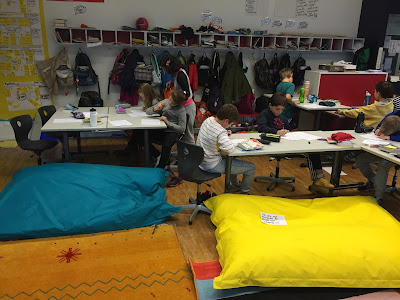We began our new unit enquiring into fractions, decimals and percentages by looking at our central idea and in table groups, writing down everything we knew about it.
The purpose behind this was to:
° pre-assess where we are at with our understandings
° start tuning the learners into what we will be enquiring into by reflecting on what we already know
° help us gain an understanding of why it is important that we learn about how to use fractions / decimals / % as we do use them in our daily lives
Some of our understandings:
After jotting down our understandings, the groups passed their posters around. They read through the other group's ideas and circled one idea they felt was interesting. The posters were continually passed around so that everyone could read and think about different understandings we have.
Tomorrow, we will revisit these ideas and each student will choose 3 skills of using fractions /decimals /% to learn how to do during the week and discovering how we might use those 3 skills in real life situations.
This will enable each student to take ownership of their learning by evaluating their own understandings and levels and where they feel their next steps should be. It will also allow for a greater range of differentiation as fractions tends to be that particular maths strand where we have so many differing levels of understandings.
They will be encouraged to buddy up with other classmates who identify the same skills and at the end of the week, they will create an activity that teaches others in the class the skill the enquired into in a creative way.
This will help them further understand our earlier enquiry into the learning pyramid which we often refer to:
We know have a pretty solid understanding in our class that we should be teaching others what we have learnt to help us deepen our understandings and to help retain new knowledge.








































